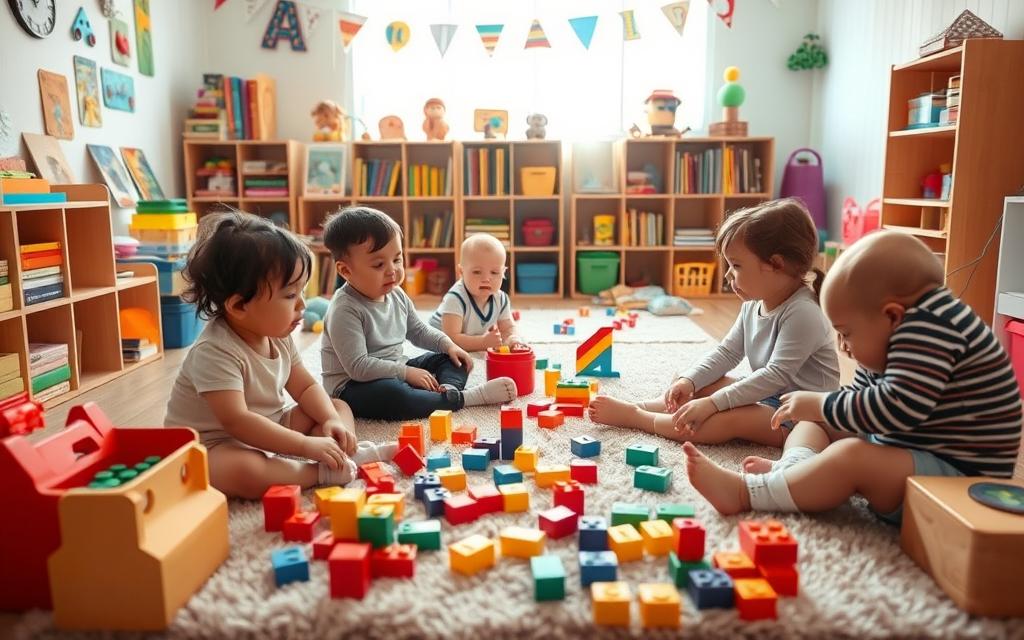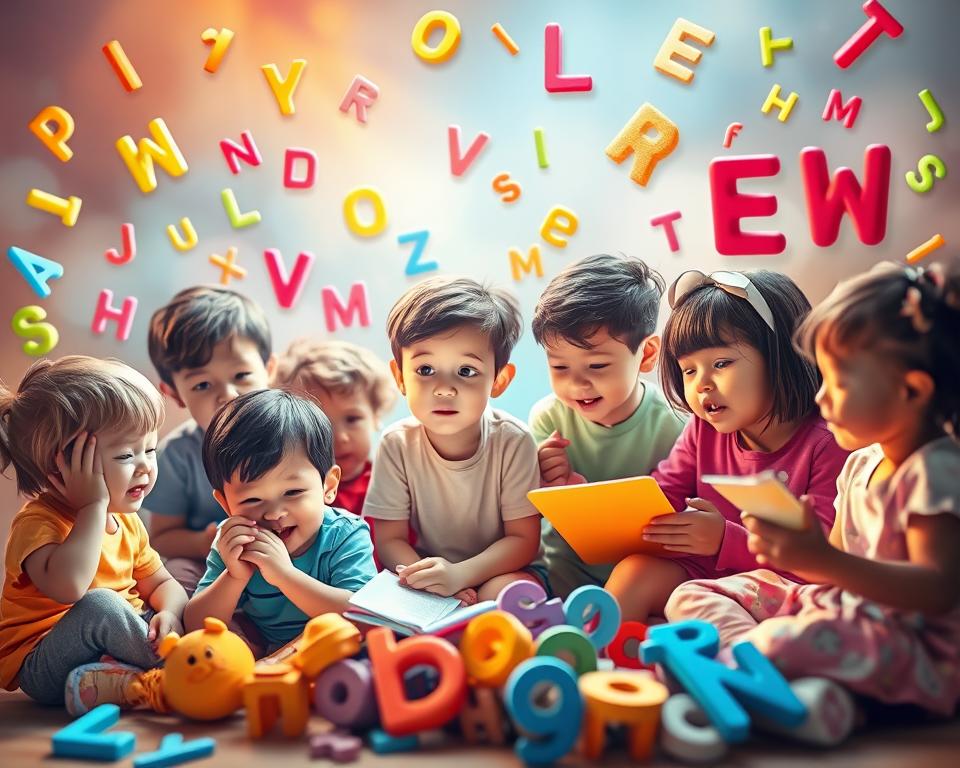Did you know that play and language skills in children are closely linked? Mr. Fred Rogers once said, “Play is really the work of childhood.” It’s key for their growth in thinking, social skills, and language. Studies by Whitehurst et al. (1994) showed that play helps preschoolers improve their language and reading skills. This shows how vital the role of play and language development in toddlers. It’s a time for them to learn social skills, communicate, and grow emotionally. All these help them develop their language skills.
Understanding the Foundations of Early Language Development
Language development in toddlers starts at birth. It’s crucial to give kids a rich language environment. Play-based language learning is a great way to help. It includes activities like reading, singing, and talking.
Studies link language growth to play levels in young ones. Each play stage, from watching to working together, aids in language skills. For instance, onlooker/solitary play boosts vocabulary and sounds. Cooperative play improves talking and teamwork.
- Children at 3 months typically coo, smile, and laugh
- By 4-6 months, babies usually start babbling with single-syllable sounds like ‘ba’
- Around 10-11 months, infants might say their first word and understand its meaning
Knowing these milestones helps parents support toddlers’ language growth. Play-based language learning is a key method. It works well with other activities for language development in toddlers to foster language skills.
How Play and Language Development in Toddlers Intersect
Play is key for toddlers, and it’s crucial for language development. Studies show that symbolic play links closely to language skills. It lets kids use words to stand for things and actions. This skill is vital for speech development in young children, helping them talk and understand words better.
Several factors affect how play and language development meet in toddlers. These include:
- Symbolic play: This play helps kids use words to represent things and actions.
- Imaginative play: It boosts creativity and problem-solving, important for language.
- Social play: It improves communication skills like sharing and working together.
Research links play and language development in toddlers closely. Play-based learning benefits speech development in young children. For example, singing and reciting rhymes enhance phonological awareness and language skills. Playing with blocks also improves spatial awareness and problem-solving, key for language.
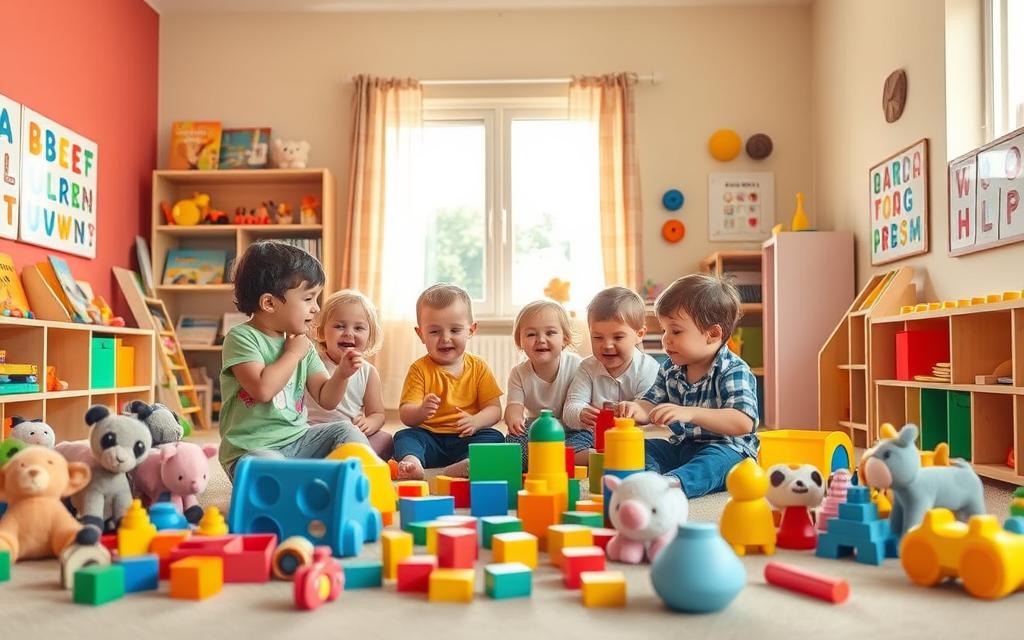
The connection between play and language in toddlers is complex. By offering chances for symbolic, imaginative, and social play, parents and caregivers support language growth. This sets kids up for success in the future.
The Science Behind Play-Based Learning
Research shows kids are born ready to learn through play. This makes play-based learning key in early childhood. It helps kids explore, learn, and grow new skills. By promoting language skills through play, they build symbolic knowledge and develop language.
Studies in teaching, learning, play, and neuroscience highlight play’s role in cognitive growth. Playful learning is joyful, meaningful, and interactive. It helps kids develop important skills like problem-solving and conflict resolution.
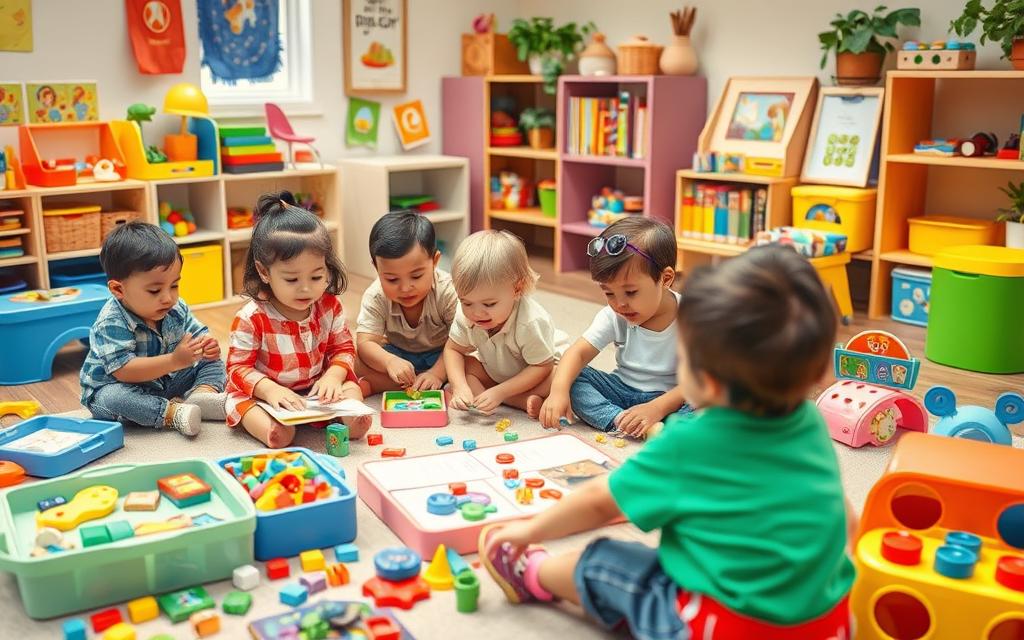
- Building essential skills that help children adapt to a constantly changing world
- Developing lifelong competencies, such as problem-solving and conflict resolution
- Fostering creativity and imagination, skills that are crucial for a child’s development
Play-based learning in early education gives kids a strong start. It promotes language skills through play and supports their overall growth.
Types of Play That Enhance Language Skills
Playing in different ways is key for toddlers to grow their language skills. Play is both fun and teaches important lessons. For example, pretend play helps kids use language to talk and work with others.
Interactive games, role-playing, and telling stories are great for language skills. These activities help kids learn new words, how to put sentences together, and how to communicate. Play also lets kids share their feelings and see things from others’ points of view.
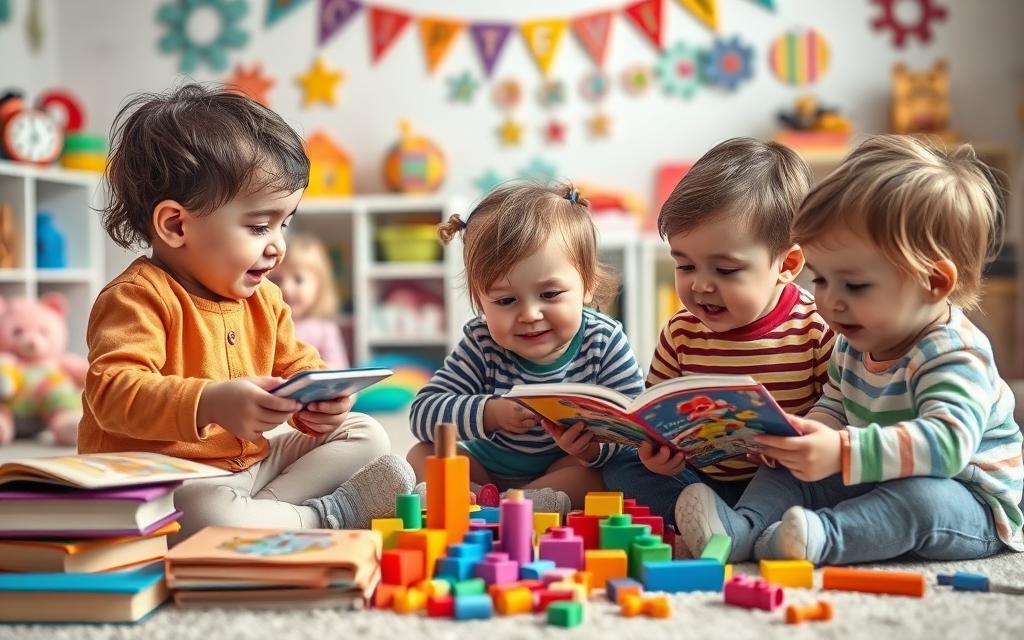
Other plays like building with blocks and moving around also help language skills. Building blocks and making art improve hand-eye coordination. Physical play boosts overall health and motor skills. By adding these plays to their day, caregivers help toddlers get better at talking and prepare them for the future.
Here are some ways to boost language skills in toddlers:
- Reading books together and talking about the story and characters
- Playing interactive games, such as “Simon Says” or “Red Light, Green Light”
- Engaging in role-playing activities, such as pretending to be a doctor or a chef
- Singing songs and reciting nursery rhymes
By offering a variety of play, caregivers help toddlers improve their language skills. These activities should be enjoyable and give kids chances to practice speaking in a supportive setting. This way, kids develop a love for learning that will stay with them forever.
Social Play and Communication Development
Play-based language learning is key for kids, especially in social play. When kids play together, they learn to talk and work things out. This is important for their speech skills.
Studies show that cooperative play is the last stage of play. It’s when kids can really talk and understand each other. This stage is crucial for learning language, as it lets kids share their thoughts.
Some key benefits of social play for communication development include:
- Improved vocabulary and sentence structure
- Enhanced ability to express thoughts and ideas
- Developed negotiation and communication skills
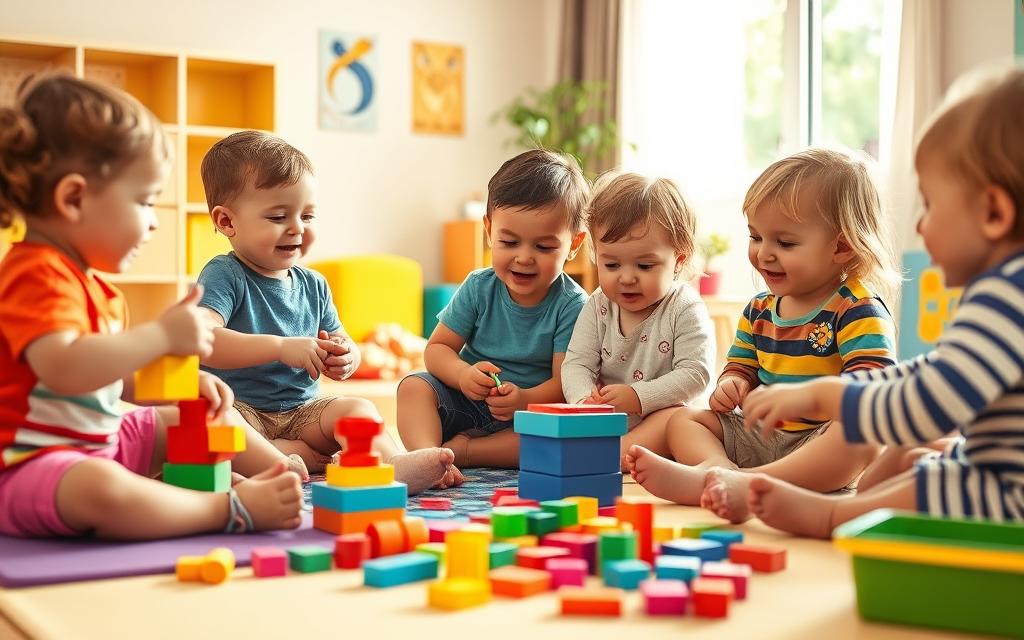
As kids play together, they learn how important talking is to reach goals. This is vital for learning language in a fun way.
Research says kids under 2 shouldn’t watch screens much, except for video calls with people they know. But for kids over 2, some screen time can help with learning. By making play a part of their daily life, parents can help kids improve their speech. This sets them up for success in school and social life.
The Impact of Imaginative Play on Vocabulary Growth
Imaginative play is key for a child’s growth, especially in learning new words. It’s a powerful way for kids to learn language skills. For example, playing with dolls or toy cars helps them learn words like “wash” and “clean”.
Adults can help by adding new words to playtime. Asking if a doll is hungry or if a toy is dirty can spark learning. Research has shown that pretend play boosts kids’ language skills. They use more complex words than usual.
Here are some ways to help toddlers grow their language skills through play:
- Playing with cups and introducing vocabulary words like filling, dumping, full, and empty
- Engaging in role-playing scenarios, such as Halloween dress-up activities, to enhance imaginative play and vocabulary development
- Incorporating imaginative play into routine activities like bath time to teach children vocabulary related to body parts, cleanliness, and daily routines
Jerome Bruner, a psychologist, says pretend play helps kids learn to read and write. By setting up interesting places like a store or doctor’s office, caregivers can encourage learning. This helps kids grow their vocabulary.
Structured vs. Unstructured Play: Finding the Right Balance
Finding the right mix of structured and unstructured play is key for toddlers. Adult support is vital in this balance. It helps kids learn new language skills in a guided way.
Studies show that structured play boosts communication skills by 15% in kids. Yet, 80% of kids who play freely show more creativity. Mixing both types of play improves cognitive skills by 25% in 3-5 year olds.
Structured play helps with:
- Skill development
- Teamwork and cooperation
- Routine and structure
Unstructured play, on the other hand, boosts:
- Fostering creativity and imagination
- Independence and decision-making
- Stress relief
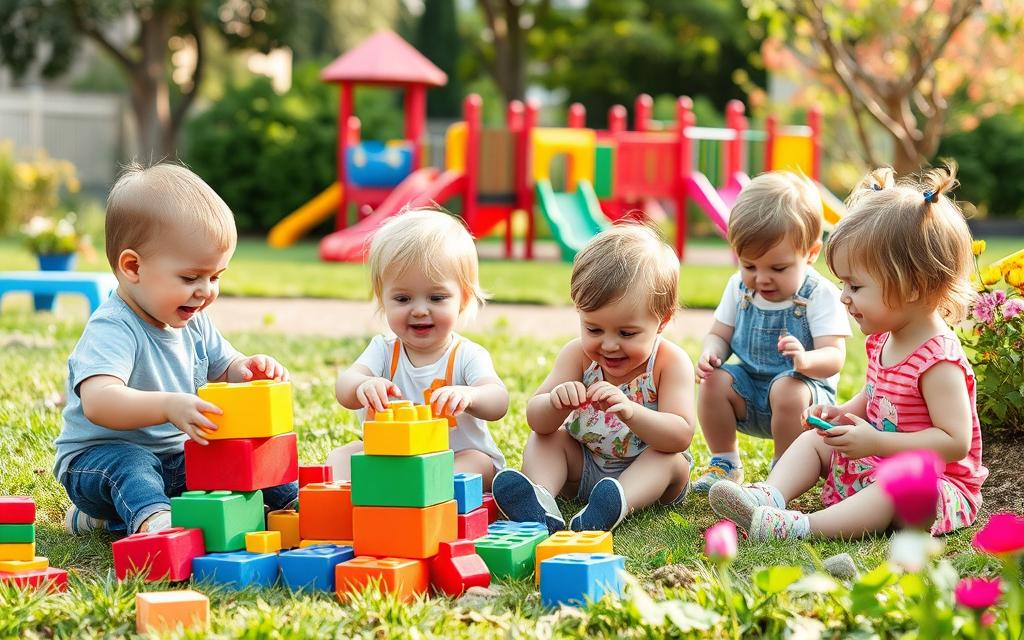
By mixing structured and unstructured play, caregivers offer a balanced learning experience. This supports overall development and language skills in toddlers.
Technology and Interactive Play in Language Learning
Young children spend a lot of time with screens today. It’s important to think about how this affects their language skills. Technology can help with language development if used right. It should encourage interactive play, not just watching.
Here are some tips for using technology in language learning:
- Limit screen time to one to two hours a day for kids over 2
- Pick interactive software that helps with language skills
- Let kids explore and learn at their own pace
Studies show digital play can make learning fun and engaging. It helps kids learn to read and speak better. The right technology can make learning personal and fun, boosting language skills.
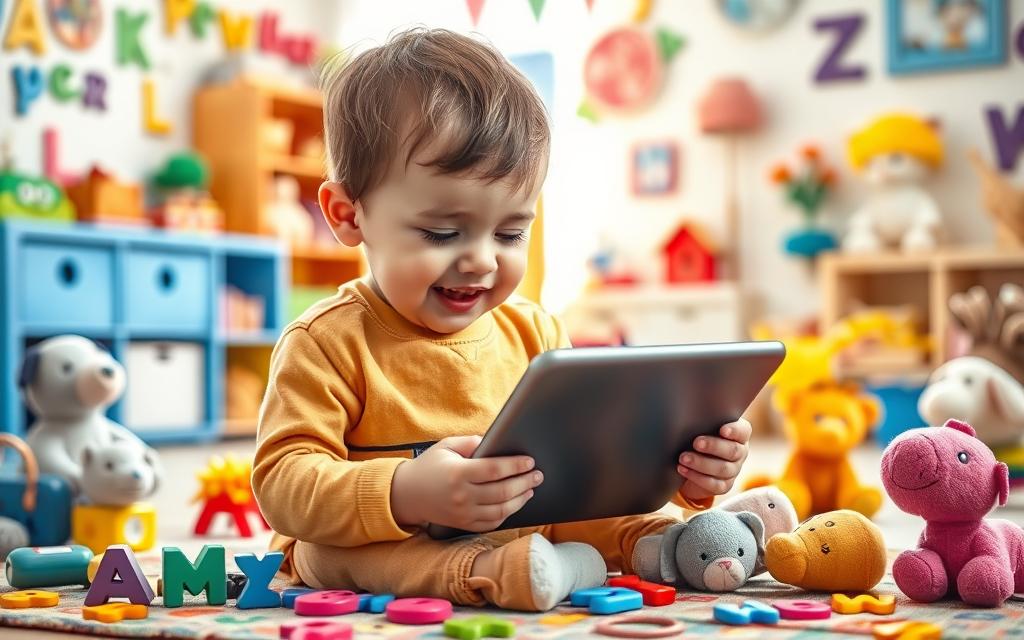
Technology and interactive play can create a great learning space for kids. Caregivers and teachers can help kids learn and grow. This mix of play and tech can make a big difference in their language skills.
Common Challenges and Solutions in Play-Based Language Development
Play-based language learning is key for a child’s growth. It helps them learn through fun activities. Some kids might face challenges like disabilities or language delays. But, with the right help, they can still learn and grow.
Studies show that play-based learning boosts vocabulary in young kids. For instance, Girolametto et al. (2002) found that play-based methods greatly improved vocabulary. Also, using sign language with words helps kids speak more, as Goodwyn et al. (2000) discovered.
Some common issues in play-based learning include:
- Language delays or disorders
- Disabilities or special needs
- Limited access to play-based activities
To tackle these problems, parents and caregivers can offer support and adjustments, such as:
- Adapting play-based activities to meet the child’s needs
- Providing additional support and therapy
- Encouraging interactive play and communication
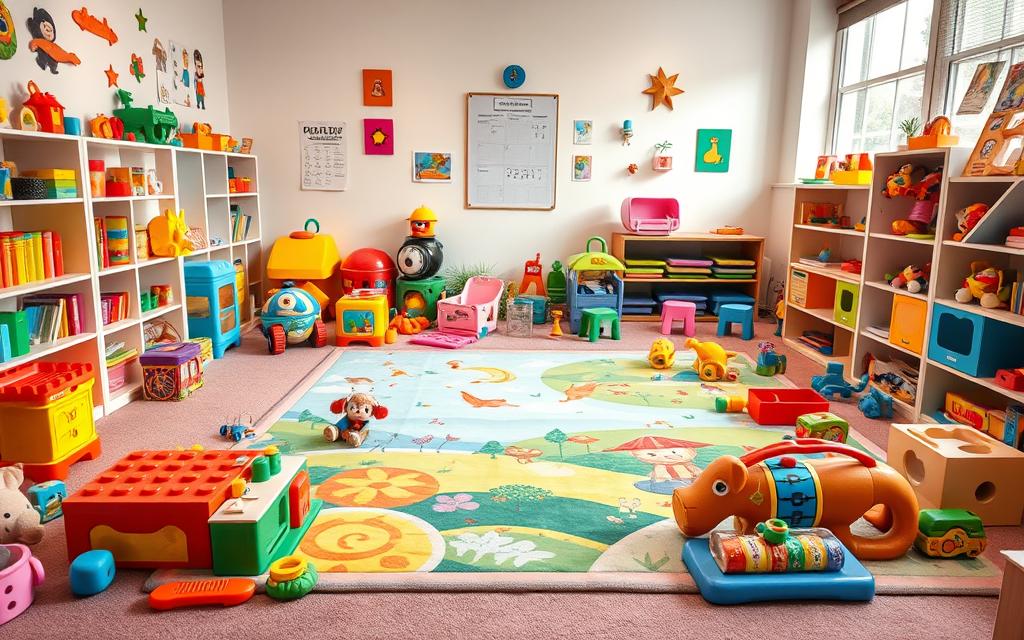
By creating a supportive and fun environment, parents and caregivers can help kids overcome play barriers. This way, they can develop their language skills through play-based learning and activities for toddlers.
Creating a Language-Rich Play Environment at Home
Play is key for language growth in toddlers. Setting up a play area at home that’s rich in language can boost their language skills. Play offers chances for social interaction and learning. It makes learning fun and effective for kids.
To promote language skills through play, offer various materials and activities. Reading books, singing songs, and playing games that need talking can help. Also, using big words and talking with kids can grow their vocabulary and improve their speaking.
Here are some tips for a language-rich play space at home:
- Give chances for social play and interactive learning.
- Use language to talk with kids and have conversations.
- Encourage kids to share their thoughts through play and creative activities.
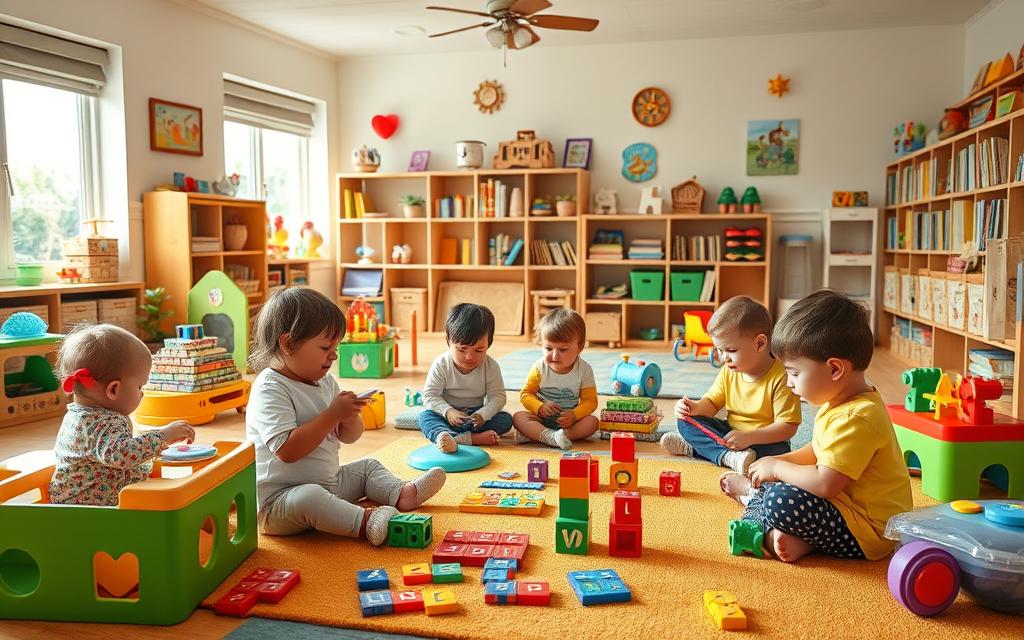
By following these tips, parents and caregivers can help kids grow their language skills. This sets them up for a lifelong love of learning. Play is vital for language development, and prioritizing it gives kids a great start in life.
The Role of Caregivers in Play-Based Language Learning
Caregivers are crucial in play and language development in toddlers. They offer children chances to play under their guidance. This play is key for speech development in young children, helping them learn and practice new words in a safe space. The TMW Center for Early Learning + Public Health’s Tune In, Talk More, Take Turns program shows how caregivers can help all children learn language equally.
Conversational turn-taking is a big part of play-based learning. Studies show kids who take turns talking with caregivers do better in language and have higher IQs. The 3Ts Home Visiting curriculum helps caregivers and kids take turns more, improving language skills. Some benefits include:
- Increased knowledge about early childhood development among caregivers
- More engagement in conversational turn-taking between caregivers and children
- Positive changes in language development within six months of the program
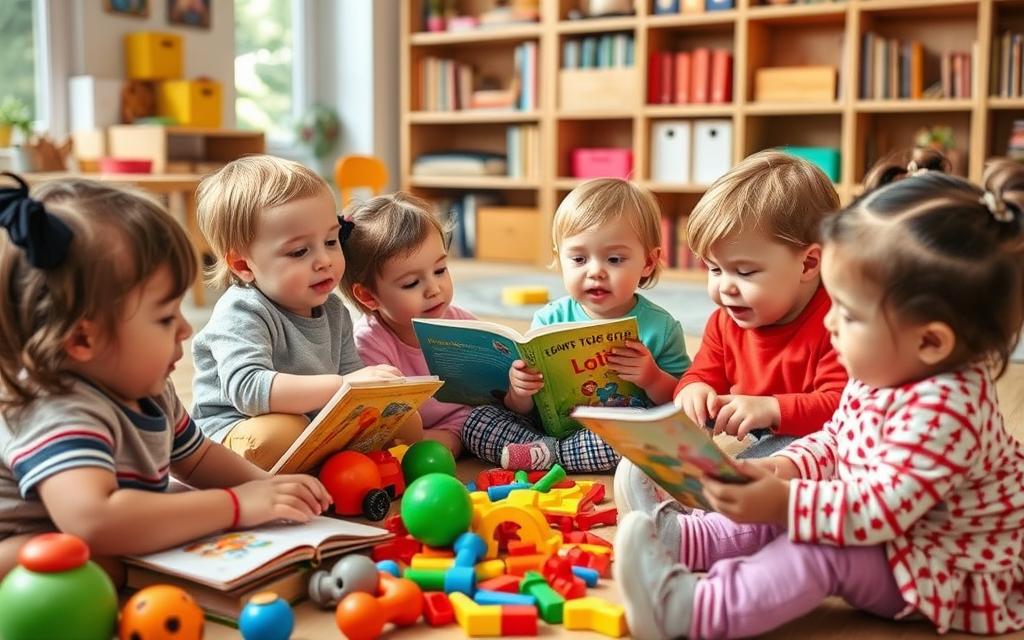
Caregivers can also boost play and language development in toddlers by talking more to them. Studies find that kids who hear more from caregivers grow up with better language skills. By creating a rich language environment and taking turns in conversations, caregivers can support speech development in young children and prepare them for the future.Conclusion: Embracing Play as a Path to Language Mastery
Play is key for toddlers learning language. It’s a vital part of their journey. Parents, caregivers, and teachers can open up new worlds for them.
Studies show play boosts language and spatial skills. It’s better than just playing freely. Play also helps with thinking, social skills, and feelings, preparing kids for school.
Even though play is good, old ways often focus on tests. But, a new trend is making schools more playful. This lets teachers and families get involved.
By valuing play, we help kids love language. This love will help them all their lives. We should mix structured and free play to help every child grow.
The Link Between Play and Language Development in Toddlers
Play is an essential activity for toddlers, serving as a foundation for their cognitive, social, and emotional growth. One of its most profound benefits is its impact on language acquisition. The link between play and language development in toddlers is well-documented, as play provides an engaging and natural context for learning words, practicing communication, and developing social skills. Here’s an exploration of how play fosters language development in toddlers and why it’s crucial for their growth.
1. Play Provides Real-Life Context for Language Use
Toddlers learn language most effectively when it’s tied to real-world experiences. Play creates meaningful opportunities to connect words to objects, actions, and concepts, helping toddlers understand and retain new vocabulary.
Example: During pretend play with a toy kitchen, toddlers learn words like “spoon,” “stir,” and “hot” by associating them with actions and objects.
2. Encourages Interaction and Communication
Play and language development in toddlers are deeply interconnected because play encourages interaction. Through cooperative games or role-play, toddlers practice taking turns, responding to others, and using language to express needs and ideas.
Example: While playing house, a toddler might say, “You be the baby, and I’ll be the mommy,” practicing sentence structure and role-based communication.
3. Builds Vocabulary Through Repetition
Repetition is key to language learning, and play offers plenty of opportunities for repeated exposure to words and phrases. Singing songs, playing with toys, or engaging in storytelling helps toddlers hear and use new vocabulary in different contexts.
Example: Singing “Old MacDonald Had a Farm” repeatedly reinforces animal names and sounds, making it fun and memorable.
4. Stimulates Imaginative Play and Narrative Skills
Imaginative play allows toddlers to create stories and scenarios, building their narrative skills. These activities teach them how to organize thoughts, sequence events, and use descriptive language, which are foundational for storytelling and conversation.
Example: A toddler acting out a trip to the zoo might say, “First, we saw the lions, then we fed the giraffes,” practicing storytelling.
5. Enhances Social Skills and Pragmatic Language
Play is often social, teaching toddlers how to use language in various social contexts. Through interactions, they learn to ask questions, negotiate, express feelings, and interpret others’ responses, all of which contribute to pragmatic language development.
Example: In a group setting, toddlers may negotiate who gets to use a specific toy, saying, “Can I have a turn next?” or “Let’s share it.”
6. Supports Problem-Solving and Cognitive Growth
The link between play and language development in toddlers extends to problem-solving activities, which encourage critical thinking and the use of language to find solutions. For instance, building blocks or puzzles prompt toddlers to describe their actions and seek help when needed.
Example: A toddler building a tower might say, “This block is too big” or “Help me find a square one,” using language to solve problems.
7. Promotes Active Listening and Comprehension
Play helps toddlers develop listening skills as they follow instructions, respond to prompts, or listen to others during group activities. This active engagement builds comprehension, an essential component of language development.
Example: In a Simon Says game, toddlers practice listening for instructions like “Touch your nose” or “Clap your hands,” reinforcing understanding.
8. Introduces Abstract Concepts and Symbolism
Symbolic play, such as pretending a banana is a phone, introduces abstract thinking. This type of play is closely tied to language development because it helps toddlers understand that words are symbols representing objects, actions, or ideas.
Example: A toddler pretending to drive a car might say, “Beep beep! Watch out!” using symbolic play to connect sounds and language to actions.
9. Encourages Emotional Expression
Play provides a safe space for toddlers to express emotions and learn vocabulary to describe their feelings. Emotional expression during play helps them communicate needs, frustrations, and joys more effectively.
Example: A toddler playing with dolls might say, “Baby is sad. She needs a hug,” practicing emotional language.
10. Fosters Parent-Child Bonding and Language Exposure
Engaging in play with parents or caregivers strengthens bonds and exposes toddlers to richer language input. Adults can model proper grammar, introduce new vocabulary, and encourage conversation during playtime.
Example: Reading a book together during play encourages the toddler to name objects, point to pictures, or repeat phrases, enriching language exposure.
Tips to Maximize the Benefits of Play for Language Development
- Encourage Open-Ended Play: Provide toys that inspire creativity, like blocks, dolls, or art supplies, to allow toddlers to use their imagination and language.
- Narrate Play Activities: Describe actions or objects during play to expand your child’s vocabulary.
- Ask Open-Ended Questions: Prompt toddlers to think and respond, such as, “What should we do next?” or “Why do you think that happened?”
- Incorporate Songs and Rhymes: Use music and rhymes during play to make language learning fun and engaging.
- Join in the Fun: Actively participate in play to model language use and encourage communication.
The link between play and language development in toddlers is undeniable. Play offers a natural, enjoyable way for toddlers to build vocabulary, practice communication, and develop social and cognitive skills. By fostering an environment rich in playful opportunities, parents and educators can give toddlers the tools they need for lifelong language success.
Key Takeaways
- Play is essential for language development in toddlers, as it helps develop cognitive, social, and language skills.
- Play-based interventions can significantly improve language and literacy skills in preschool children.
- The importance of play for language development is crucial, as it provides a platform for toddlers to engage in activities that foster social skills and communication.
- Toddler language development is closely linked to play, as it helps develop vocabulary, sequencing, and predicting skills.
- Play and language development in toddlers are intertwined, and providing opportunities for play can support healthy brain development and relationships with peers and caregivers.
- Parents and caregivers can enhance speech development through play by engaging in open-ended play that nurtures creativity and imagination.
- Play serves as a platform for infants and toddlers to manipulate objects, experience new language, and enhance relationships with caregivers and peers.
Source Links
- Play in speech development — Ability Innovations – https://www.abilityinnovations.com/blog/play-in-speech-development
- PDF – https://www.theministryofparenting.com/wp-content/uploads/2018/05/The-Importance-of-Play-in-the-Development-of-Language-Skills.pdf
- Importance of Play in Early Childhood | ECLKC – https://eclkc.ohs.acf.hhs.gov/curriculum/article/importance-play-early-childhood
- Language development in children: 0-8 years – https://raisingchildren.net.au/babies/development/language-development/language-development-0-8
- Speech and Language Developmental Milestones – https://www.nidcd.nih.gov/health/speech-and-language
- Play’s Potential in Early Literacy Development | Encyclopedia on Early Childhood Development – https://www.child-encyclopedia.com/play/according-experts/plays-potential-early-literacy-development
- Language Development Activities for 2-3 Year Olds – About Play – https://aboutplaysc.com/language-development-activities-for-2-3-year-olds/
- The scientific case for learning through play – https://learningthroughplay.com/explore-the-research/the-scientific-case-for-learning-through-play
- The science of play: The importance of play-based learning – bestchance Child Family Care – https://www.bestchance.org.au/blog/the-science-of-play-the-importance-of-play-based-learning/
- Supporting Language and Literacy Skills from 0-12 Months – https://www.zerotothree.org/resource/supporting-language-and-literacy-skills-from-0-12-months/
- Toys To Promote Speech And Language Development – The Clubhouse – https://www.communicationclubhouse.com/blog/toys-to-promote-speech-and-language-development/
- 5 Types of Play in Child Development – https://getgoally.com/blog/types-of-play-in-child-development/
- Language and play: toddlers – https://raisingchildren.net.au/toddlers/play-learning/play-toddler-development/talking-play-toddlers
- What are Play Skills? [Implications for Speech and Language Development] – https://www.communicationcommunity.com/what-are-play-skills-and-why-are-they-important/
- What is Imaginative Play and Why is it Important for Young Children – https://www.startearly.org/post/imaginative-play/
- The Power of Pretend Play in Language & Literacy Learning | Expert Advice | The Genius of Play – https://thegeniusofplay.org/genius/expert-advice/articles/the-power-of-pretend-play-in-language-and-literacy-learning.aspx
- Unstructured Vs Structured Play & Examples | Playground Centre – https://www.playgroundcentre.com/unstructured-vs-structured-play/
- Finding the Balance in Early Education – San Marino Preschool – https://sanmarinopreschool.com/the-benefits-of-structured-vs-unstructured-play-finding-the-balance-in-early-education/
- PDF – https://www.naeyc.org/files/naeyc/file/positions/ps_technology_web2.pdf
- Technology and |Language Development in Early Childhood| – https://www.ictesolutions.com.au/blog/how-to-better-implement-ict-activities-for-language-development/
- 5 Common Challenges in Speech Therapy for Babies and Toddlers – Speech Sisters Blog – https://www.speechsisters.com/blog/5-common-challenges-in-speech-therapy-for-babies-and-toddlers
- Common Challenges in Child Language Development – https://www.mywellnesshub.in/blog/child-language-development-challenges/
- Oral Language Development and ELLs: 5 Challenges and Solutions – https://www.colorincolorado.org/article/oral-language-development-and-ells-5-challenges-and-solutions
- Language-Rich Environment: Enhancing Children Language Skills – https://bbmacademy.com/blog/language-rich-environment-for-children/
- 10 Easy Ways to Cultivate a Language Rich Environment in Your Home – https://amshq.org/Blog/2021_10_30-10-Easy-Ways-to-Cultivate-a-Language-Rich-Environment-in-Your-Home
- Parents and Caregivers Are Vital to Children’s Early Learning and Development – Early Learning Nation – https://earlylearningnation.com/2024/12/parents-and-caregivers-are-vital-to-childrens-early-learning-and-development/
- The role of caregiver speech in supporting language development in infants and toddlers with autism spectrum disorder – https://pmc.ncbi.nlm.nih.gov/articles/PMC7872436/
- The Power of Playful Learning in the Early Childhood Setting – https://www.naeyc.org/resources/pubs/yc/summer2022/power-playful-learning
- Benefits of Play Based Learning in Early Education — My Teaching Cupboard – https://www.myteachingcupboard.com/blog/benefits-of-play-based-learning
- Embracing Play: A Paradigm Shift in Education – https://www.linkedin.com/pulse/embracing-play-paradigm-shift-education-tripta-tarunesh–xgzhc

